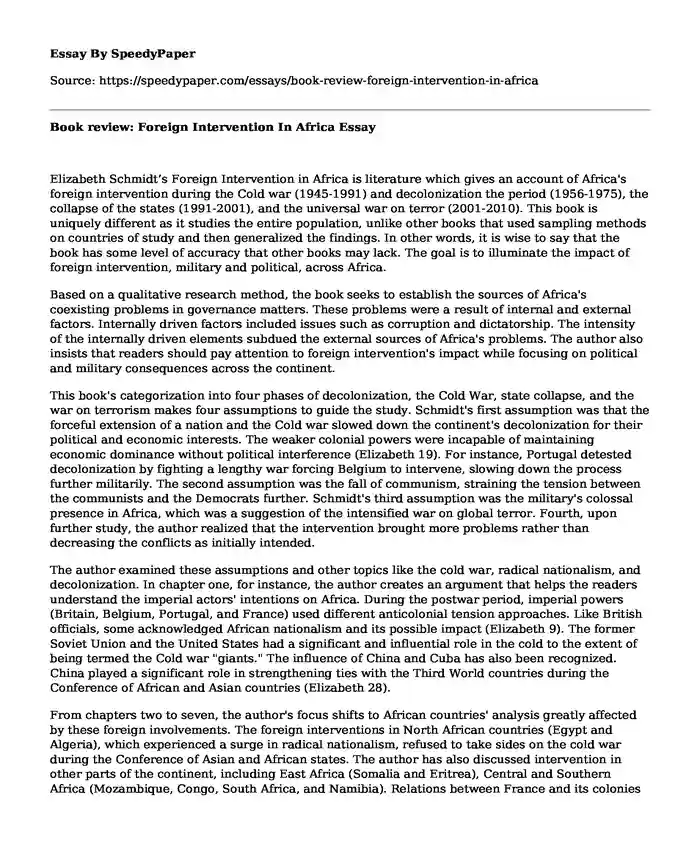
| Type of paper: | Book review |
| Categories: | Literature Books |
| Pages: | 3 |
| Wordcount: | 708 words |
Elizabeth Schmidt’s Foreign Intervention in Africa is literature which gives an account of Africa's foreign intervention during the Cold war (1945-1991) and decolonization the period (1956-1975), the collapse of the states (1991-2001), and the universal war on terror (2001-2010). This book is uniquely different as it studies the entire population, unlike other books that used sampling methods on countries of study and then generalized the findings. In other words, it is wise to say that the book has some level of accuracy that other books may lack. The goal is to illuminate the impact of foreign intervention, military and political, across Africa.
Based on a qualitative research method, the book seeks to establish the sources of Africa's coexisting problems in governance matters. These problems were a result of internal and external factors. Internally driven factors included issues such as corruption and dictatorship. The intensity of the internally driven elements subdued the external sources of Africa's problems. The author also insists that readers should pay attention to foreign intervention's impact while focusing on political and military consequences across the continent.
This book's categorization into four phases of decolonization, the Cold War, state collapse, and the war on terrorism makes four assumptions to guide the study. Schmidt's first assumption was that the forceful extension of a nation and the Cold war slowed down the continent's decolonization for their political and economic interests. The weaker colonial powers were incapable of maintaining economic dominance without political interference (Elizabeth 19). For instance, Portugal detested decolonization by fighting a lengthy war forcing Belgium to intervene, slowing down the process further militarily. The second assumption was the fall of communism, straining the tension between the communists and the Democrats further. Schmidt's third assumption was the military's colossal presence in Africa, which was a suggestion of the intensified war on global terror. Fourth, upon further study, the author realized that the intervention brought more problems rather than decreasing the conflicts as initially intended.
The author examined these assumptions and other topics like the cold war, radical nationalism, and decolonization. In chapter one, for instance, the author creates an argument that helps the readers understand the imperial actors' intentions on Africa. During the postwar period, imperial powers (Britain, Belgium, Portugal, and France) used different anticolonial tension approaches. Like British officials, some acknowledged African nationalism and its possible impact (Elizabeth 9). The former Soviet Union and the United States had a significant and influential role in the cold to the extent of being termed the Cold war "giants." The influence of China and Cuba has also been recognized. China played a significant role in strengthening ties with the Third World countries during the Conference of African and Asian countries (Elizabeth 28).
From chapters two to seven, the author's focus shifts to African countries' analysis greatly affected by these foreign involvements. The foreign interventions in North African countries (Egypt and Algeria), which experienced a surge in radical nationalism, refused to take sides on the cold war during the Conference of Asian and African states. The author has also discussed intervention in other parts of the continent, including East Africa (Somalia and Eritrea), Central and Southern Africa (Mozambique, Congo, South Africa, and Namibia). Relations between France and its colonies during the colonial and the post-colonial period were also examined. Chapter eight dwells on the war on global terror and the militarization of Africa by United States troops. According to Schmidt, communism replaced terrorism, resulting from America's cry following the 9/11 terror attack on the United States (Elizabeth 195).
The book accomplished its stated goal of researching and demonstrating knowledge of Africa’s histories and political intricacies. Despite the author having done outstanding work, there is a drawback of the author's inability to establish and examine China's current intervention in Africa in search of economic resources and political clout (Elizabeth 28). The author did not demonstrate China's current involvement in Africa. Nevertheless, Elizabeth Schmidt did exemplary research making his work resourceful for academics and investigators with a critical interest in Africa.
Works Cited
Schmidt, Elizabeth. Foreign intervention in Africa: From the cold war to the war on terror. No7. Cambridge University Press, 2013.
Schmidt, Elizabeth. Foreign intervention in Africa after the cold war: Sovereignty, responsibility, and the war on terror. Ohio University Press, 2018.
Cite this page
Book review: Foreign Intervention In Africa. (2024, Jan 15). Retrieved from https://speedypaper.net/essays/book-review-foreign-intervention-in-africa
Request Removal
If you are the original author of this essay and no longer wish to have it published on the SpeedyPaper website, please click below to request its removal:
- Essay Example with a Reflection Paper about an Article
- How to Overcome Fear - Free Essay on The Kite Runner
- The Progressive Era. Poetry Essay Example.
- The Vacuum Poem Research - A Literary Essay Sample
- Beowulf Win the (Flyting) in Unferth's Challenge - Literary Essay Sample
- Research Paper on Existential Themes in the "The Trial" by Franz Kafka
- Paper Example on Coat of Arms
Popular categories




